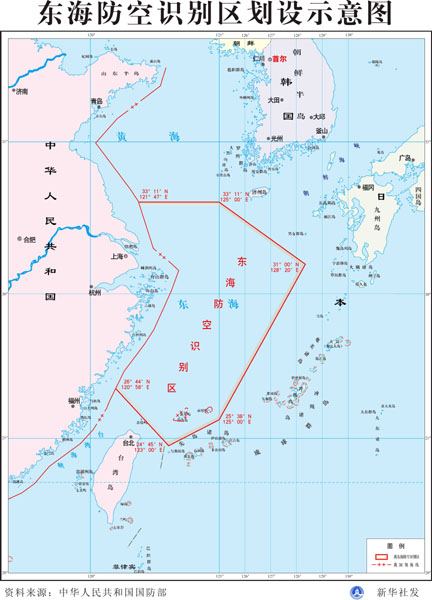 |
| East China Sea Air Defense Identification Zone Photo: xinhuanet.com |
The major American airlines United, American and Delta have notified Chinese authorities of flight plans when traveling through the Air Defense Identification Zone (ADIZ) Beijing has declared over the East China Sea, following US government advice Friday.
Although the US government also stated the advisory does not mean it complies with China's newly established zone, observers consider this a softened gesture following the provocative challenge of sending two bombers into the zone on November 25, two days after China's announcement of its establishment.
"The US government generally expects that US carriers operating internationally will operate consistent with NOTAMs (Notices to Airmen) issued by foreign countries," the US State Department stated on its official website on Friday in regards to the guidance of US carriers over the zone.
However, it added that the advisory "does not indicate US government acceptance of China's requirements for operating in the newly declared ADIZ."
Compared to initial reactions, in which the US government strongly protested over China's ADIZ and accused it of stoking up tensions in the western Pacific, experts say the guidance to civil aviation signals a pragmatic subtle shift of the US stance.
Hong Lin, a CCTV commentator, said on Sunday that the US action shows it understands the meaning of the ADIZ.
"The US and Japan have an alliance and need to have some coordinated actions to some degree. But after the probe and show of strength, the US returned to being sensible and rational, suggesting that flight companies submit their plans to China," he said. "The US is telling Japan how to really understand the ADIZ through its actions."
Since China established the ADIZ on November 23, the US sent two unarmed B-52s into the zone two days later without notifying China.
Last Thursday, Japan and South Korea also flew aircraft in the zone without informing China.
Yang Yujun, the Chinese defense ministry spokesman, said after a press conference last Thursday that the Chinese military monitors all aircraft that enter the zone and has full knowledge of them.
En Shuo, a People's Liberation Army (PLA) Navy expert, told the Global Times on Sunday that the US government's change of attitude now might be because of the interaction between China and the US since the establishment of the zone.
En said she suspects the moderate actions taken by the Chinese side have shown the US government that China intends no hostile activities.
"The US understands that China is treating the zone as an air defense identification zone, not as an extended airspace territory, so it thinks China obeys rules and it's normal the attitude became more moderate," she said.
The US government focuses more on whether its military planes will be intercepted when flying and whether reconnaissance aircraft can operate in the zone, En said.
After sending the bombers over, it discovered China did not restrict flights around the perimeter. With the combination of consideration for the safety of passengers on commercial airliners, the US government advises companies to comply with Chinese rules, she said.
Since the establishment of China's air defense zone, a number of regional commercial airlines, such as Singapore Airlines, Qantas and Korean Air have all declared they will comply with the Chinese rules.
Japanese airlines All Nippon Airways and Peach Aviation originally submitted their flight plans to China even as Tokyo said otherwise, but they reversed the decision without explanation on Tuesday.
US Vice President Joe Biden will visit Japan from Monday through Wednesday and will discuss the ADIZ before going to China and South Korea.
A joint statement will be compiled during the meeting between Japanese Prime Minister Shinzo Abe and Biden this week in Tokyo, the Yomiuri Shimbun reported on Saturday.
 Heavy cargo flights taking off
Heavy cargo flights taking off In pictures: PLA's digital equipment
In pictures: PLA's digital equipment  Americans mark Thanksgiving Day with parades
Americans mark Thanksgiving Day with parades Self-made farmer billionaire donates 69 villas at hometown
Self-made farmer billionaire donates 69 villas at hometown Demolition of bizarre rooftop villa in Beijing still in progress
Demolition of bizarre rooftop villa in Beijing still in progress Service seminar for E China train attendants
Service seminar for E China train attendants  Supermodel-turned-designer
Supermodel-turned-designer Cheerleaders light up CBA regular season
Cheerleaders light up CBA regular season  Finland--anytime you want is right time to go: Ambassador
Finland--anytime you want is right time to go: Ambassador Youths in Night club: photo story
Youths in Night club: photo story Models dazzle at Int'l Yacht Model Pageant
Models dazzle at Int'l Yacht Model Pageant  How to apply for a green card in China
How to apply for a green card in China Selected sports photos of the week
Selected sports photos of the week Annual Santa Claus parade held in Canada's Montreal
Annual Santa Claus parade held in Canada's Montreal China's aircraft carrier passes through Taiwan Strait
China's aircraft carrier passes through Taiwan StraitDay|Week|Month